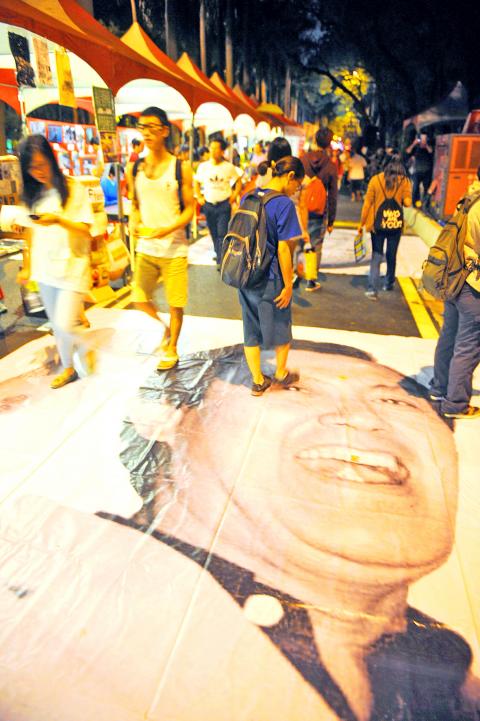Armed with tents and sleeping bags, thousands of protesters camped out overnight on Taipei’s Renai Road last night, in a massive “sleepout” launched by the Housing Movement (巢運) to protest what critics say are soaring housing prices and government inaction toward them.
Led by a coalition of more than 70 civic groups, the movement issued three demands: comprehensive reform of housing policies — including a major overhaul of the nation’s property tax system to curb speculative investment — the enactment of formal legislation to promote construction of public housing; and the protection of housing rights against the interests of land expropriation projects.
According to the organizers, about 10,000 people turned out to participate in the protest, which also paid tribute to the landmark Snails Without Shells movement, a sleepout held on Aug. 26, 1989, against unaffordable housing, which saw more than 50,000 protesters camp out overnight on the city’s Zhongxiao E Road.

Photo: Lo Pei-der, Taipei Times
Despite sporadic drizzle, yesterday’s demonstrations went on undeterred, starting with a rally at the site of the Snails Without Shells’ camp 25 years ago.
Lee Hsing-chang (李幸長), who described himself as an “old snail” who led the 1989 movement, led a procession from Zhongxiao E Road toward the Renai Road protest site.
Protesters congregated on the pavement in front of The Palace (帝寶) luxury residential complex, which is widely recognized as the most expensive piece of real-estate in the nation. Rows of small tents and sleeping bags lined the road’s leafy median islands, accompanied by stands promoting the ideas of the participating civic advocacy groups.

Photo: Wang Min-wei, Taipei Times
At one point, protesters lay down on the pavement to express their discontent, while raising their cellphones in unison to “light up the darkness.”
The protesters spent the night chanting slogans such as “Destroy cronyism, strive for fairness” and “Give me housing rights, make housing affordable,” while activist musicians gave live performances throughout the night.
The crowd was galvanized by guest appearances from prominent activists, including Taiwan Labor Front secretary-general Son Yu-liam (孫友聯), Sunflower movement leader Chen Wei-ting (陳為廷) and human rights lawyer Lai Chung-chiang (賴中強). Representatives from various communities threatened by forced evacuation for development projects also showed up to express their solidarity with the movement.
“Our current administration can pass a cross-strait service trade agreement within 30 seconds, but chooses to do nothing about housing prices for 25 years,” said Peng Yang-kai (彭揚凱), one of the Housing Movement leaders.
A diverse range of people made up the crowd that camped out overnight on the grass among the rows of trees on the road’s median islands.
Chu Yucheng (朱育成), a high-tech industry employee in his 20s, said he supports the movement’s demands, especially on tax reform and public housing. He said he came with several friends, and they made themselves comfortable spreading out sheets of cardboard on the grass around their sleeping bags. Some of the other “campers” came with their entire family.
Housing prices in Taipei have reached an average of NT$675,000 per ping (US$6, 695 per square meter), meaning that the average apartment costs 15.01 times the average annual household income, statistics from the Ministry of the Interior show. Real-estate prices have about tripled since 2001, while wages have stagnated for the vast majority of the workforce.
Comparative statistics show Taipei is leading the world in terms of the cost of housing. According to a report from US-based consulting company Demographia, Hong Kong’s housing prices were 14.9 times the average income, with Vancouver and San Francisco following at 10.3 and 9.2 times respectively.
Critics have lambasted the government for its perceived inaction in reforming the nation’s property tax system. Property taxes are based on land value assessments conducted by local governments, which typically amount to less than half of a transaction’s actual price. The system is said to encourage opportunistic investment
In response to the Housing Movement’s demands, ministry officials reiterated government plans to increase the number of public housing units to 34,000. Yet critics say that proposal is equivalent to just 0.4 percent of housing nationwide, a figure that falls far short of the international public housing standard of 5 percent.
Earlier yesterday, Democratic Progressive Party (DDP) Chairperson Tsai Ing-wen (蔡英文) commented on the issue on Facebook, saying: “Housing should be a right people have as they pursue happiness; it should not become a burden.”
Former DPP chairman Su Tseng-chang (蘇貞昌) also took to Facebook to show his support.
“A house is a home, not a piece of merchandise. Housing is a right that the government should protect,” Su said. “A housing policy should allow everyone to have a home, to live with quality and dignity.”
He added that the government should intervene to keep housing prices reasonable, push for a better rental market so that idle houses could become homes and strive to provide more public housing.
Additional reporting by Loa Iok-sin

The US government has signed defense cooperation agreements with Japan and the Philippines to boost the deterrence capabilities of countries in the first island chain, a report by the National Security Bureau (NSB) showed. The main countries on the first island chain include the two nations and Taiwan. The bureau is to present the report at a meeting of the legislature’s Foreign Affairs and National Defense Committee tomorrow. The US military has deployed Typhon missile systems to Japan’s Yamaguchi Prefecture and Zambales province in the Philippines during their joint military exercises. It has also installed NMESIS anti-ship systems in Japan’s Okinawa

‘WIN-WIN’: The Philippines, and central and eastern European countries are important potential drone cooperation partners, Minister of Foreign Affairs Lin Chia-lung said Minister of Foreign Affairs Lin Chia-lung (林佳龍) in an interview published yesterday confirmed that there are joint ventures between Taiwan and Poland in the drone industry. Lin made the remark in an exclusive interview with the Chinese-language Liberty Times (the Taipei Times’ sister paper). The government-backed Taiwan Excellence Drone International Business Opportunities Alliance and the Polish Chamber of Unmanned Systems on Wednesday last week signed a memorandum of understanding in Poland to develop a “non-China” supply chain for drones and work together on key technologies. Asked if Taiwan prioritized Poland among central and eastern European countries in drone collaboration, Lin

TRAGEDY STRIKES TAIPEI: The suspect died after falling off a building after he threw smoke grenades into Taipei Main Station and went on a killing spree in Zhongshan A 27-year-old suspect allegedly threw smoke grenades in Taipei Main Station and then proceeded to Zhongshan MRT Station in a random killing spree that resulted in the death of the suspect and two other civilians, and seven injured, including one in critical condition, as of press time last night. The suspect, identified as a man surnamed Chang Wen (張文), allegedly began the attack at Taipei Main Station, the Taipei Fire Department said, adding that it received a report at 5:24pm that smoke grenades had been thrown in the station. One man in his 50s was rushed to hospital after a cardiac arrest

ON ALERT: Taiwan’s partners would issue warnings if China attempted to use Interpol to target Taiwanese, and the global body has mechanisms to prevent it, an official said China has stationed two to four people specializing in Taiwan affairs at its embassies in several democratic countries to monitor and harass Taiwanese, actions that the host nations would not tolerate, National Security Bureau (NSB) Director-General Tsai Ming-yen (蔡明彥) said yesterday. Tsai made the comments at a meeting of the legislature’s Foreign Affairs and National Defense Committee, which asked him and Minister of National Defense Wellington Koo (顧立雄) to report on potential conflicts in the Taiwan Strait and military preparedness. Democratic Progressive Party (DPP) Legislator Michelle Lin (林楚茵) expressed concern that Beijing has posted personnel from China’s Taiwan Affairs Office to its